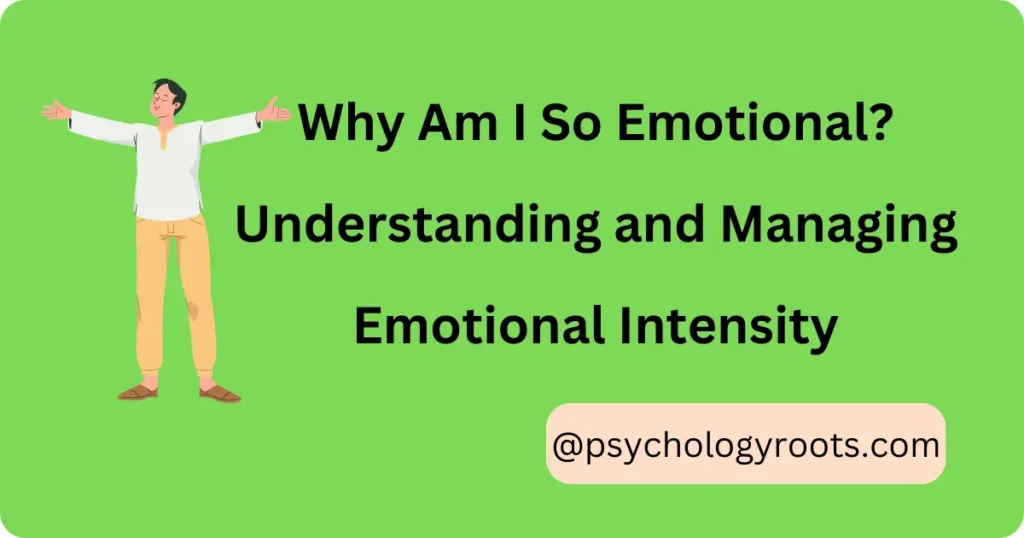Table of Contents
Why Am I So Emotional? Understanding and Managing Emotional Intensity
Here in this post, we are discussing “Why Am I So Emotional? Understanding and Managing Emotional Intensity”. You can read more about psychology-related material on our website. Keep visiting Psychology Roots.
Table of Contents
Have you ever found yourself wondering, “Why am I so emotional?” It’s a common question that many individuals ask themselves when they experience overwhelming feelings. Emotional intensity can significantly impact our daily lives and relationships, but it’s essential to remember that you’re not alone in this journey.

Understanding the Reasons Behind Emotional Intensity
Emotional intensity can stem from various factors, such as past experiences, hormonal changes, or even genetic predispositions. It’s crucial to recognize that there’s no one-size-fits-all answer to why some individuals are more emotionally sensitive than others. However, gaining insight into the possible reasons can be a valuable step toward managing and regulating your emotions effectively.
The Role of Self-Care in Emotional Well-being
Self-care plays a vital role in managing emotional intensity. Engaging in activities that promote relaxation, such as meditation, deep breathing exercises, or engaging in hobbies, can help reduce stress levels and improve emotional well-being. Prioritizing self-care also involves maintaining a healthy lifestyle, including regular exercise, sufficient sleep, and a balanced diet. Remember, self-care is not selfish—it’s a necessary component of your overall mental health.
Therapy can provide valuable support and guidance for individuals struggling with emotional intensity. Seeking professional help from a therapist or counselor can offer a safe space to explore and address underlying emotional issues. Therapists can help you develop coping mechanisms, gain self-awareness, and provide strategies to regulate your emotions effectively. Consider therapy as an empowering tool to enhance your emotional well-being and overall quality of life.
Practical Tips for Managing Your Emotions
Here are some practical tips to help you navigate your emotional intensity:
- Practice mindfulness and self-reflection: Observe your emotions without judgment and identify triggers that intensify them.
- Develop healthy coping mechanisms: Engage in activities that bring you joy, relaxation, and emotional release, such as journaling, art, or talking to a trusted friend.
- Seek support from loved ones: Share your feelings with trusted individuals who can provide a listening ear and offer support.
- Set boundaries: Learn to say “no” when necessary and prioritize your emotional well-being.
- Consider professional help: If your emotional intensity significantly affects your daily functioning, seeking therapy or counseling can be immensely beneficial.
Remember, it’s essential to be patient and compassionate with yourself as you navigate your emotional journey. Understanding the reasons behind your emotional intensity and adopting effective strategies will help you lead a more balanced and fulfilling life.
Conclusion:
Understanding the complex interplay of biological, psychological, and environmental factors behind emotional overload is key to finding balance and emotional well-being. By embracing self-care practices, seeking therapy, and developing a deeper understanding of ourselves, we can navigate the challenges of heightened emotions and cultivate a healthier emotional landscape.
Help Us Improve This Article
Have you discovered an inaccuracy? We put out great effort to give accurate and scientifically trustworthy information to our readers. Please notify us if you discover any typographical or grammatical errors.
Make a comment. We acknowledge and appreciate your efforts.
If you have any scale or any material related to psychology kindly share it with us at psychologyroots@gmail.com. We help others on behalf of you.